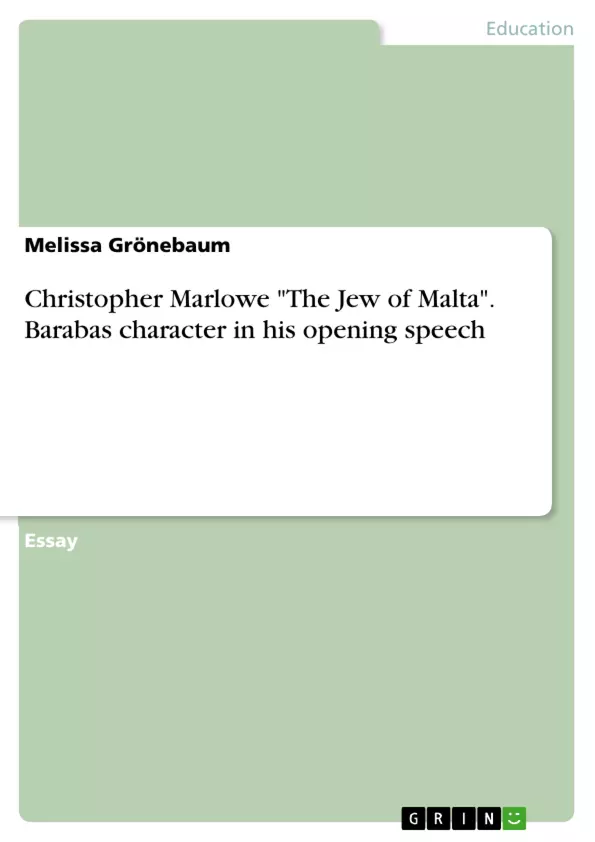Barabas is a very rich but never as a citizen of Malta accepted Jew, who is hated for being rich and for being a Jew. He therefore is more or less alienated from Malta’s Christian society although he is quite important for the people. Barabas, however, seems to accept his social position; in fact, he even prefers to be hated, but rich, successful, and Jewish instead of being "pitied in a Christian poverty." At the beginning of the play, Barabas is displayed as a wealthy and shrewd but also very selfish and intelligent man, whose motivation is money only. During the story Barabas undergoes a change of personality and presents his evilness more and more.
Table of Contents
- Barabas' Opening Speech and Character
Objectives and Key Themes
The objective of this essay is to analyze the character of Barabas in Marlowe's play, focusing specifically on his opening speech to understand his initial personality and motivations. This analysis seeks to explore how much of his later malevolence is already present at the beginning of the play.
- Barabas's obsession with wealth and its implications
- The contrast between Barabas's economic success and social alienation
- Barabas's amorality and its roots in his materialistic worldview
- The evolution of Barabas's character throughout the play (as hinted at in the opening speech)
- Anti-Semitic stereotypes and their portrayal in the character of Barabas
Chapter Summaries
Barabas' Opening Speech and Character: This essay analyzes Barabas' opening monologue to determine the extent to which his later evil nature is foreshadowed in his initial presentation. The monologue focuses heavily on Barabas's wealth, acquired through shrewd business dealings with Arabians and Persians. He boasts about his successful ventures and expresses contempt for those he perceives as hindering profitable trade. Barabas's prioritization of wealth over morality is clearly established, revealing his materialistic values and lack of concern for religious or social norms. He reveals a disdain for those who attribute his wealth to divine intervention, indicating a lack of religiosity, further emphasizing his self-reliance and ambition. The monologue ultimately suggests that while not overtly evil initially, Barabas already exhibits a ruthlessness and self-centeredness that lays the groundwork for his later actions. His obsession with wealth and his disregard for anything else, particularly morality and religion, form the foundation for his eventual descent into villainy. His focus on his business dealings, to the exclusion of any mention of family or other personal relationships, underlines the extent to which he is driven purely by financial gain and self-aggrandizement. This economic self-reliance and disregard for others forms the basis of his later actions and shows how his greed lays the groundwork for his subsequent cruelty.
Keywords
Barabas, Marlowe, The Jew of Malta, opening speech, character analysis, wealth, greed, anti-Semitism, morality, ambition, materialism, revenge, social alienation, economic success.
Frequently Asked Questions: Analysis of Barabas' Opening Speech in Marlowe's *The Jew of Malta*
What is the overall objective of this analysis?
This essay analyzes the character of Barabas in Christopher Marlowe's *The Jew of Malta*, specifically focusing on his opening speech to understand his initial personality, motivations, and the extent to which his later malevolence is foreshadowed.
What are the key themes explored in this analysis?
Key themes include Barabas's obsession with wealth and its consequences, the contrast between his economic success and social alienation, his amorality rooted in materialism, the evolution of his character (as hinted at in the opening speech), and the portrayal of anti-Semitic stereotypes in his character.
What is the main focus of the chapter summarizing Barabas' opening speech?
The analysis of Barabas' opening monologue examines how his later evil nature is foreshadowed. It highlights his emphasis on wealth acquired through shrewd business dealings, his contempt for those hindering trade, and his prioritization of wealth over morality and religious norms. The chapter argues that while not overtly evil initially, Barabas's ruthlessness, self-centeredness, and obsession with wealth lay the groundwork for his later actions and cruelty. His disregard for family and personal relationships, coupled with his economic self-reliance, underlines his drive for financial gain and self-aggrandizement.
What key words are associated with this analysis?
Key words include Barabas, Marlowe, *The Jew of Malta*, opening speech, character analysis, wealth, greed, anti-Semitism, morality, ambition, materialism, revenge, social alienation, and economic success.
What aspects of Barabas' character are highlighted in the opening speech?
Barabas' opening speech reveals his materialism, lack of religiosity, ruthlessness, self-centeredness, and ambition. It showcases his prioritization of wealth and business dealings above all else, including morality and personal relationships. His disdain for those who attribute his wealth to divine intervention further emphasizes his self-reliance and lack of concern for religious or social norms.
How does the opening speech contribute to understanding Barabas' later actions?
The opening speech demonstrates that the seeds of Barabas's later villainy are already present in his initial presentation. His obsession with wealth, disregard for morality, and self-reliance are the foundations upon which his subsequent cruelty and revenge are built. The speech foreshadows his descent into evil by revealing his fundamental character flaws.
What is the significance of the anti-Semitic stereotypes in the portrayal of Barabas?
The analysis acknowledges the presence of anti-Semitic stereotypes in the character of Barabas and implicitly addresses their portrayal within the context of the play and the historical period. Further research might be needed to fully explore this complex aspect.
- Quote paper
- Melissa Grönebaum (Author), 2013, Christopher Marlowe "The Jew of Malta". Barabas character in his opening speech, Munich, GRIN Verlag, https://www.grin.com/document/268380



